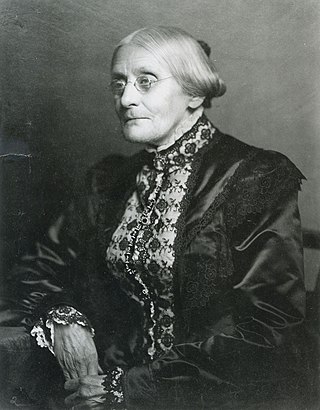
Susan B. Anthony was an American social reformer and women's rights activist who played a pivotal role in the women's suffrage movement. Born into a Quaker family committed to social equality, she collected anti-slavery petitions at the age of 17. In 1856, she became the New York state agent for the American Anti-Slavery Society.
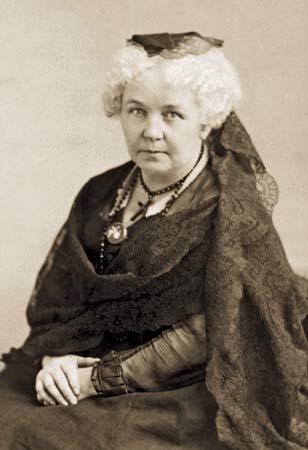
Elizabeth Cady Stanton was an American writer and activist who was a leader of the women's rights movement in the U.S. during the mid- to late-19th century. She was the main force behind the 1848 Seneca Falls Convention, the first convention to be called for the sole purpose of discussing women's rights, and was the primary author of its Declaration of Sentiments. Her demand for women's right to vote generated a controversy at the convention but quickly became a central tenet of the women's movement. She was also active in other social reform activities, especially abolitionism.

Concerned Women for America (CWA) is a socially conservative, evangelical Christian non-profit women's legislative action committee in the United States. Headquartered in Washington D.C., the CWA is involved in social and political movements, through which it aims to incorporate Christian ideology. The group is primarily led by well-funded anti-feminist interests.
Liberal feminism, also called mainstream feminism, is a main branch of feminism defined by its focus on achieving gender equality through political and legal reform within the framework of liberal democracy and informed by a human rights perspective. It is often considered culturally progressive and economically center-right to center-left. As the oldest of the "Big Three" schools of feminist thought, liberal feminism has its roots in 19th century first-wave feminism seeking recognition of women as equal citizens, focusing particularly on women's suffrage and access to education, the effort associated with 19th century liberalism and progressivism. Liberal feminism "works within the structure of mainstream society to integrate women into that structure." Liberal feminism places great emphasis on the public world, especially laws, political institutions, education and working life, and considers the denial of equal legal and political rights as the main obstacle to equality. As such liberal feminists have worked to bring women into the political mainstream. Liberal feminism is inclusive and socially progressive, while broadly supporting existing institutions of power in liberal democratic societies, and is associated with centrism and reformism. Liberal feminism tends to be adopted by white middle-class women who do not disagree with the current social structure; Zhang and Rios found that liberal feminism with its focus on equality is viewed as the dominant and "default" form of feminism. Liberal feminism actively supports men's involvement in feminism and both women and men have always been active participants in the movement; progressive men had an important role alongside women in the struggle for equal political rights since the movement was launched in the 19th century.
Equality feminism is a subset of the overall feminism movement and more specifically of the liberal feminist tradition that focuses on the basic similarities between men and women, and whose ultimate goal is the equality of all genders in all domains. This includes economic and political equality, equal access within the workplace, freedom from oppressive gender stereotyping, and an androgynous worldview.
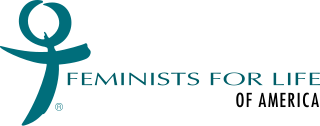
Feminists for Life of America (FFL) is a non-profit, anti-abortion feminist, non-governmental organization (NGO). Established in 1972, and now based in Alexandria, Virginia, the organization publishes a biannual magazine, The American Feminist, and aims to reach young women, college students in particular.
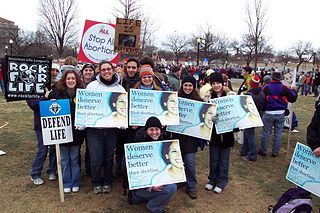
The United States anti-abortion movement contains elements opposing induced abortion on both moral and religious grounds and supports its legal prohibition or restriction. Advocates generally argue that human life begins at conception and that the human zygote, embryo or fetus is a person and therefore has a right to life. The anti-abortion movement includes a variety of organizations, with no single centralized decision-making body. There are diverse arguments and rationales for the anti-abortion stance. Some anti-abortion activists allow for some permissible abortions, including therapeutic abortions, in exceptional circumstances such as incest, rape, severe fetal defects, or when the woman's health is at risk.
Antifeminism, also spelled anti-feminism, is opposition to some or all forms of feminism. In the late 19th century and early 20th century, antifeminists opposed particular policy proposals for women's rights, such as the right to vote, educational opportunities, property rights, and access to birth control. In the mid and late 20th century, antifeminists often opposed the abortion-rights movement and, in the United States, the Equal Rights Amendment.
The American Woman Suffrage Association (AWSA) was a single-issue national organization formed in 1869 to work for women's suffrage in the United States. The AWSA lobbied state governments to enact laws granting or expanding women's right to vote in the United States. Lucy Stone, its most prominent leader, began publishing a newspaper in 1870 called the Woman's Journal. It was designed as the voice of the AWSA, and it eventually became a voice of the women's movement as a whole.

Susan B. Anthony Pro-Life America is a 501(c)(4) non-profit organization that seeks to reduce and ultimately end abortion in the U.S. by supporting anti-abortion politicians, primarily women, through its SBA List Candidate Fund political action committee.
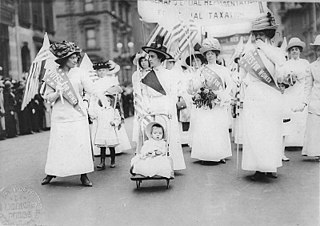
Feminism is aimed at defining, establishing, and defending a state of equal political, economic, cultural, and social rights for women. It has had a massive influence on American politics. Feminism in the United States is often divided chronologically into first-wave, second-wave, third-wave, and fourth-wave feminism.

Marjorie Jones Dannenfelser is an American activist who is the president of the Susan B. Anthony Pro-Life America, an American political organization that seeks to advance anti-abortion women in politics. She was brought into the organization as its executive director in 1993, shortly after its founding by Rachel MacNair.
Some variants of feminism are considered more conservative than others. Historically feminist scholars tend to not have much interest in conservative women but in recent years there have been efforts at greater scholarly analysis of these women and their views.
Ann Dexter Gordon is an American research professor in the department of history at Rutgers University and editor of the papers of Elizabeth Cady Stanton and Susan B. Anthony, a survey of more than 14,000 papers relating to the pair of 19th century women's rights activists. She is also the editor of the multi-volume work, Selected Papers of Elizabeth Cady Stanton and Susan B. Anthony, and has authored a number of other books about the history of the women's suffrage movement. She worked with popular historian Ken Burns on his 1999 book and appears in his documentary film about Stanton and Anthony. Since 2006, Gordon has repeatedly weighed in on the Susan B. Anthony abortion dispute stating that "Anthony spent no time on the politics of abortion. It was of no interest to her."
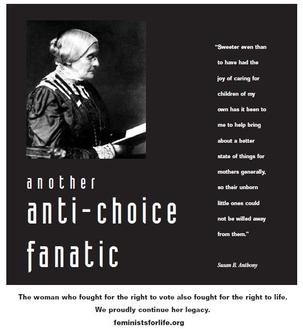
Susan B. Anthony was a leader of the American women's suffrage movement whose position on abortion has been the subject of a modern-day dispute. The dispute has primarily been between anti-abortion activists, who say that Anthony expressed opposition to abortion, and acknowledged authorities in her life and work who say that she did not.
Rachel M. MacNair is an American sociologist and psychologist who adheres to the consistent life ethic. She is an activist against abortion and war, and has written against the culture of violence and the eating of meat. An expert on veteran psychology, she coined the term "Perpetration-Induced Traumatic Stress" (PITS), a form of posttraumatic stress disorder (PTSD) that may result from the action of killing. She edited Working for Peace: A Handbook of Practical Psychology. She is also a Quaker, which influences her anti-violence work.

Abortion-rights movements, also self-styled as pro-choice movements, advocate for the right to have legal access to induced abortion services including elective abortion. They seek to represent and support women who wish to terminate their pregnancy without fear of legal or social backlash. These movements are in direct opposition to anti-abortion movements.
Susan B. Anthony List v. Driehaus, 573 U.S. 149 (2014), is a United States Supreme Court case.

The socio-political movements and ideologies of feminism have found expression in various media. These media include newspaper, literature, radio, television, social media, film, and video games. They have been essential to the success of many feminist movements.











